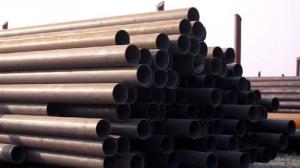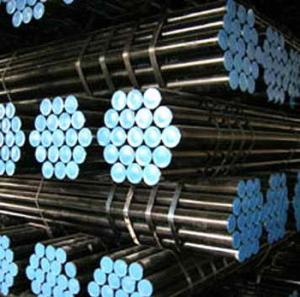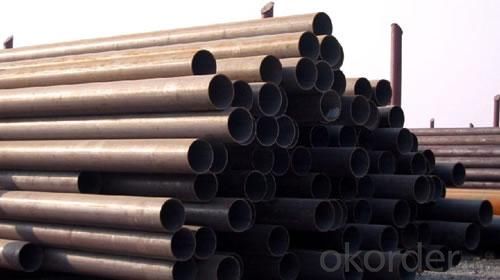JIS G3462(Alloy Steel For Boiler And Heat Exchanger)
- Loading Port:
- China Main Port
- Payment Terms:
- TT or LC
- Min Order Qty:
- 20mt m.t.
- Supply Capability:
- 5000 Tons Per Month m.t./month
OKorder Service Pledge
OKorder Financial Service
You Might Also Like
Specifications of JIS G3462 Alloy Steel For Boiler And Heat Exchanger
1. Type:JIS G3462 Alloy Steel for Boiler and Heat Exchanger Tubes (STBA12/ 13/ 20/ 22)
2. OD:12-680mm
3. WT: 2-60mm
Application of JIS G3462 Alloy Steel For Boiler And Heat Exchanger
Packaging:
Inner Packing:Caps at both ends, steel strong trips on every bundle
Outer Packing:Standard export package or as per clients' requirements Catalouge of our products
Standard and Usage of JIS G3462 Alloy Steel For Boiler And Heat Exchanger
1. GB5310 Seamless Steel Pipe For High Pressure Boiler
2. GB6479High Pressure Seamless Pipe For Chemical Fertilizer Equipment
3. GB9948Seamless steel tube for petroleum cracking Tube
4. ASTM A213 Seamless Ferritic and Austenitic Alloy-Steel Boiler, Superheater, and Heat-Exchanger Tubes
5. ASTM A335 Seamless Ferritic Alloy-Steel Pipe for High-Temperature Service
6. ASTM A179 Seamless Cold-Drawn Low-Carbon Steel Heat-Exchanger and Condenser Tubes / Pipes
7. ASTM A192 Seamless Carbon Boiler steel pipe for High-Pressure
8. ASTM A210 Seamless Medium-Carbon Boiler pipe and Superheater Tubes
9. JIS G3458 Alloy Steel Pipes (STPA 12/ 20/ 22/ 23/ 24/ 25/ 26)
10. JIS G3462 Alloy Steel for Boiler and Heat Exchanger Tubes (STBA12/ 13/ 20/ 22)
11. JIS G3467 Steel Tubes for Fired Heater (STF 410/STFA 12/ 22/ 23/ 24/ 25/ 26)
12. DIN17175-79 Electrical Resistance Or Induction Welded Steel Tubes for Elevated Temperature
Grade of JIS G3462 Alloy Steel For Boiler And Heat Exchanger
1. Cr5Mo (STFA25 STPA25 STBA25 T5 P5)
2. 15CrMo (STFA22 STPA22 STBA22 T12 P12)
3. 1.25Cr0.5Mo (STFA23 STPA23 STBA23 T11 P11)
4. Cr9Mo (STFA26 STPA26 STBA26 T9 P9)
5. 12Cr1MoV
6. 12Cr2Mo (10CrMo910 T22 P22)
7. 10Cr9Mo1VNb T91 (P91)
8. 12Cr2MoWVTiB (R102)
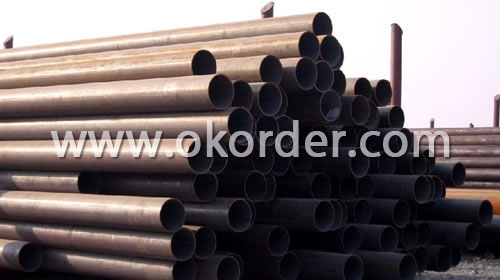
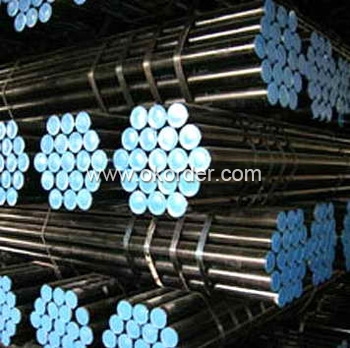
- Q: What are the safety regulations for working with steel pipes?
- The safety regulations for working with steel pipes typically include wearing appropriate personal protective equipment (PPE), such as gloves, safety glasses, and steel-toed boots, to prevent injuries. Workers should also receive training on proper handling and lifting techniques to avoid strains and sprains. Additionally, the use of proper tools and equipment, such as pipe cutters and clamps, is essential for safe operations. It is important to follow procedures for securing pipes to prevent them from rolling or falling. Finally, workers should be aware of potential hazards, such as sharp edges and hot surfaces, and practice good housekeeping to minimize slips, trips, and falls.
- Q: What is the difference between steel pipes and PVC pipes?
- Steel pipes and PVC pipes differ in material composition and their respective properties. Steel pipes are made from a combination of iron and carbon, providing them with high strength and durability. They are suitable for carrying pressurized fluids and can withstand extreme temperatures. On the other hand, PVC pipes are made from a synthetic plastic material called polyvinyl chloride. They are lightweight, easy to install, and resistant to corrosion and chemicals. PVC pipes are commonly used for drainage systems, irrigation, and household plumbing.
- Q: What is the difference between steel pipes and plastic pipes?
- Steel pipes are made from a strong and durable metal, while plastic pipes are made from synthetic materials like PVC or polyethylene. Steel pipes are typically used for high-pressure applications and in areas where strength and durability are key factors. On the other hand, plastic pipes are more lightweight, corrosion-resistant, and easier to install. They are commonly used for low-pressure applications and in areas where chemical resistance is important.
- Q: What's the difference between a cracked carbon steel tube and a liquid carbon steel tube?
- Cracking carbon steel pipe higher requirements, the general carbon steel pipe to be normalized, the fluid carbon steel pipe as long as the normal annealing treatment.
- Q: How are steel pipes used in the pulp and paper industry?
- Steel pipes are commonly used in the pulp and paper industry for various applications such as transporting water, steam, chemicals, and other fluids throughout the production process. They are used in the construction of pipelines, conveying raw materials, and transferring finished products. Steel pipes provide durability, reliability, and resistance to corrosion, making them suitable for handling the harsh conditions and corrosive substances found in the industry.
- Q: Can steel pipes be used for the construction of railway tracks?
- No, steel pipes are not suitable for the construction of railway tracks. Railway tracks require specialized rails made of steel that are specifically designed to withstand the heavy loads and constant wear and tear associated with train traffic. Pipes do not have the necessary shape, strength, or durability to serve as railway tracks.
- Q: How are steel pipes used in the manufacturing of oil refineries?
- Steel pipes are used in oil refineries for a variety of purposes, including transporting crude oil and other fluids, as well as for structural applications. They are commonly used for piping systems, carrying process fluids such as oil, gas, and water, throughout the refinery. Additionally, steel pipes are used to handle corrosive and high-pressure environments, making them essential for the safe and efficient operation of oil refineries.
- Q: What are the different types of pipe fittings used with steel pipes?
- There are several types of pipe fittings commonly used with steel pipes, including elbows, tees, reducers, flanges, couplings, and unions.
- Q: What is the typical diameter range of steel pipes?
- The typical diameter range of steel pipes can vary widely, but it commonly falls between 0.5 inches to 48 inches.
- Q: How are steel pipes used in the construction of power plants?
- Steel pipes are commonly used in the construction of power plants for various purposes such as transporting fluids, gases, and steam, as well as for structural support. They are used to create a network of pipelines that carry coolant water, fuel, and other necessary fluids to different areas of the plant. Additionally, steel pipes are used for steam generation, connecting boilers to turbines and condensers, ensuring efficient energy production. The durability, strength, and high-temperature resistance of steel pipes make them an ideal choice for the demanding conditions in power plants.
1. Manufacturer Overview
| Location | Jiangsu, China |
| Year Established | 2005 |
| Annual Output Value | Above US$100 Million |
| Main Markets | Main land; Middle East; Southeast Asia |
| Company Certifications | ISO 9001:2008 |
2. Manufacturer Certificates
| a) Certification Name | |
| Range | |
| Reference | |
| Validity Period |
3. Manufacturer Capability
| a) Trade Capacity | |
| Nearest Port | Shanghai |
| Export Percentage | 61% - 70% |
| No.of Employees in Trade Department | 390People |
| Language Spoken: | English; Chinese |
| b) Factory Information | |
| Factory Size: | Above 600,000 square meters |
| No. of Production Lines | Above 10 |
| Contract Manufacturing | OEM not offered |
| Product Price Range | Average |
Send your message to us
JIS G3462(Alloy Steel For Boiler And Heat Exchanger)
- Loading Port:
- China Main Port
- Payment Terms:
- TT or LC
- Min Order Qty:
- 20mt m.t.
- Supply Capability:
- 5000 Tons Per Month m.t./month
OKorder Service Pledge
OKorder Financial Service
Similar products
Hot products
Hot Searches
Related keywords
